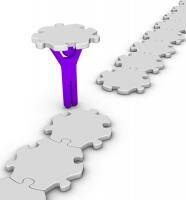Back in the late 1970s, traders buying and selling mortgages were pushed aside for new masters of the universe—“quants” or individuals that used mathematics to slice and dice mortgages into debt tranches. And in the same way, today’s traditional Business Intelligence (BI) professionals must be looking over their collective shoulders as business and IT publications tout the emerging role of “data scientist”.
Back in the late 1970s, traders buying and selling mortgages were pushed aside for new masters of the universe—“quants” or individuals that used mathematics to slice and dice mortgages into debt tranches. And in the same way, today’s traditional Business Intelligence (BI) professionals must be looking over their collective shoulders as business and IT publications tout the emerging role of “data scientist”.
Before Lew Ranieri came on the scene, mortgages were a very staid business. Banks would loan money and keep assets on the books for up to thirty years (depending on how quickly the loan was paid back). Except for underwriting skills, there wasn’t much complexity to the mortgage business.
As a trader for Salomon Brothers, Lew Ranieri changed all that. Ranieri’s insight was that mortgages could be bundled together and then sliced into different tranches of varied risk. This slicing exercise was quite complex because of a buyer’s ability to prepay their loans early or refinance. Michael Lewis, of Liar’s Poker fame writes; “Mortgages were acknowledged to be the most mathematically complex securities in the marketplace. The complexity arose entirely out of the option the homeowner has to prepay his loan…mortgages were about math.”
Suddenly the very boring business of home loans became a very complex business challenge in how to slice the pie based on risk profiles and cash flows from interest and principal. Lewis writes; “Different investors place different prices on risk. Risk could be canned and sold like tomatoes.” And this mathematical complexity demanded a new skill set—quantitative analysis—to perform the necessary mathematical modeling to ensure investment banks remained profitable in this new business.
Pushed out by a new breed of mathematical whizz-kids, many former investment bankers and traders either retired or left for smaller financial firms. And the rise of the quants—or the new masters of the universe—was complete by the mid-1980s.
Is a similar shift happening in the field of Business Intelligence with the emerging “data scientist” role? The skill set of today’s data scientist is much more robust than one who solely performs BI or ETL application development. With new sources and types of data (i.e. multi-structured), the data scientist must be able to develop new data driven products such as churn models, create recommendation algorithms, assist marketers with behavioral segmentation and targeting and more.
But that’s not all. Fellow SmartDataCollective contributor Daniel Tunkelang says the data scientist; “Also needs to possess creativity and strong communication skills. Creativity drives the process of hypothesis generation, i.e., picking the right problems to solve that will create value for users and drive business decisions.” Tall order to find all these skill sets in one person, much less build an internal competency center with such talent.
Perhaps for the foreseeable future, there’s room for both traditional BI professionals and the new breed of data scientists, as today both are valuable contributors in the field of analytics. However, with data growth on a fast paced exponential curve, much less the complexity and velocity of multi-structured data, it’s easy to see how the mix of skill sets to succeed in the future will tilt more in favor of the data scientist role.
The mortgage bankers never saw Lew Ranieri coming. Regarding the rise of data scientists—should traditional BI professionals be worried?







